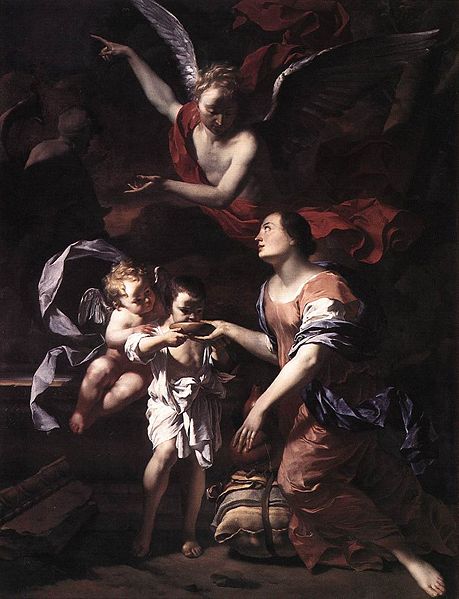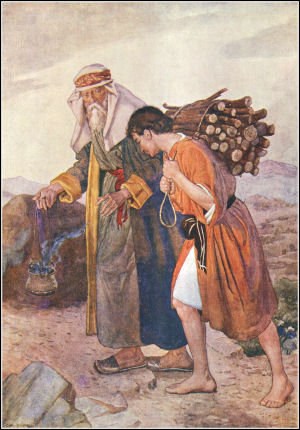Rebekah accepted the proposal of marriage, given by Eliezer. It was a great moment in bible history.
One of the most poignant moments in Genesis (Genesis 24) occurred when Rebekah accepted the marriage proposal of Eliezar, made on behalf of Abraham for the benefit of his son.
I remain of the view that Isaac, possibly as a consequence of being a treasured only child, was not a strong man. This is further born out by the fact that his father took the initiative to find him a wife and that his father also had to set standards around the whole process.
Anyway, Rebekah willingly received a nose-ring and other jewelry from Eliezar and thus took her first tacit step towards betrothal. When Laban and Bethuel saw and heard the whole story, they were willing to let her go. They conceded to God’s hand in it all.
I am still amazed at Eliezar. In accounting for himself to Laban, he confesses that all of Abraham’s wealth had been bequeathed to Isaac. Regardless of the fact that he was once deemed to be Abraham’s most likely heir, the birth of Isaac changed everything and nothing of his master’s estate was reserved for him. Yet Eliezar remained absolutely faithful to Abraham. What’s more, the risk that Rebekah might be restrained from going with him was anticipated by Abraham, in terms of which the oath would have lapsed. But Eliezar never once opted for an easy way out, rather his integrity shone through until he had fulfilled Abraham’s last wish.
Laban and Bethuel wanted to detain Rebekah for ten days, which we later see, in Jacob’s life, to be a ruse for manipulating situations to his own advantage. But Eliezar, though just a servant, was very persuasive, unwavering in his sense of duty. So they asked Rebekah what she wanted to do and when she indicated her willingness to go with Eliezar, Laban released his daughter with her hand-maidens.
The scene then cuts to the plains surround Beer Lahai Roi. The place implies God’s witness over Isaac’s life and it was where he pitched his tent. He was out in the fields one day when he saw a caravan in the distance and recognized the approaching form of Eliezar. Rebekah covered her face in a veil and prepared to meet her husband to be. In a moment of great anticipation she was introduced to Isaac who then removed her veil, a symbolic gesture of acceptance of an untouched, virgin bride.
She was so beautiful and winsome, so gracious and trusting. Yet time would reveal a very strong-minded, decisive woman, whose actions would determine the future of God’s people. Some argue that she retained some of the conniving instincts of her father and became a manipulative, grabbing person. Whatever, she was the product of God’s divine hand and the outcome vindicated God’s choice, for it was thanks to her that Abraham’s blessing never passed to the worthless lout, Esau, Isaac’s preferred son.
This story portrays a greater story of how God sent His own servant, the Holy Spirit, to draw the church from the world, as a bride for His only son. When she responded, her heart was transformed and became as virgin soil, tilled and watered for the seed of life to awaken within her. The life she carried in her heart would ultimately emerge as the heir to God’s blessing, but as she drew near to her king that heart was veiled. The veil implies partial sight, the obsuring of truth through our humanity. But when we finally come before Him, as we read in 2 Corinthians 3:16-18, the veil is taken away. Therefore, whilst we still see in part, we shall yet see Him, face to face.
The opening of our eyes and the removal of the veil of our flesh, reminds me of the most prolific hymn-writer of all times, Fanny B Crosby. Though blind, she served God faithfully in the knowledge that “the first time I see, I will be looking at my king”.
(c) Peter Eleazar at www.bethelstone.com
One of the most poignant moments in Genesis (Genesis 24) occurred when Rebekah accepted the marriage proposal of Eliezar, made on behalf of Abraham for the benefit of his son.
I remain of the view that Isaac, possibly as a consequence of being a treasured only child, was not a strong man. This is further born out by the fact that his father took the initiative to find him a wife and that his father also had to set standards around the whole process.
Anyway, Rebekah willingly received a nose-ring and other jewelry from Eliezar and thus took her first tacit step towards betrothal. When Laban and Bethuel saw and heard the whole story, they were willing to let her go. They conceded to God’s hand in it all.
I am still amazed at Eliezar. In accounting for himself to Laban, he confesses that all of Abraham’s wealth had been bequeathed to Isaac. Regardless of the fact that he was once deemed to be Abraham’s most likely heir, the birth of Isaac changed everything and nothing of his master’s estate was reserved for him. Yet Eliezar remained absolutely faithful to Abraham. What’s more, the risk that Rebekah might be restrained from going with him was anticipated by Abraham, in terms of which the oath would have lapsed. But Eliezar never once opted for an easy way out, rather his integrity shone through until he had fulfilled Abraham’s last wish.
Laban and Bethuel wanted to detain Rebekah for ten days, which we later see, in Jacob’s life, to be a ruse for manipulating situations to his own advantage. But Eliezar, though just a servant, was very persuasive, unwavering in his sense of duty. So they asked Rebekah what she wanted to do and when she indicated her willingness to go with Eliezar, Laban released his daughter with her hand-maidens.
The scene then cuts to the plains surround Beer Lahai Roi. The place implies God’s witness over Isaac’s life and it was where he pitched his tent. He was out in the fields one day when he saw a caravan in the distance and recognized the approaching form of Eliezar. Rebekah covered her face in a veil and prepared to meet her husband to be. In a moment of great anticipation she was introduced to Isaac who then removed her veil, a symbolic gesture of acceptance of an untouched, virgin bride.
She was so beautiful and winsome, so gracious and trusting. Yet time would reveal a very strong-minded, decisive woman, whose actions would determine the future of God’s people. Some argue that she retained some of the conniving instincts of her father and became a manipulative, grabbing person. Whatever, she was the product of God’s divine hand and the outcome vindicated God’s choice, for it was thanks to her that Abraham’s blessing never passed to the worthless lout, Esau, Isaac’s preferred son.
This story portrays a greater story of how God sent His own servant, the Holy Spirit, to draw the church from the world, as a bride for His only son. When she responded, her heart was transformed and became as virgin soil, tilled and watered for the seed of life to awaken within her. The life she carried in her heart would ultimately emerge as the heir to God’s blessing, but as she drew near to her king that heart was veiled. The veil implies partial sight, the obsuring of truth through our humanity. But when we finally come before Him, as we read in 2 Corinthians 3:16-18, the veil is taken away. Therefore, whilst we still see in part, we shall yet see Him, face to face.
The opening of our eyes and the removal of the veil of our flesh, reminds me of the most prolific hymn-writer of all times, Fanny B Crosby. Though blind, she served God faithfully in the knowledge that “the first time I see, I will be looking at my king”.
(c) Peter Eleazar at www.bethelstone.com





No comments:
Post a Comment